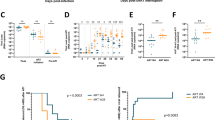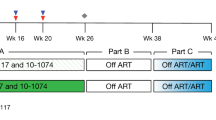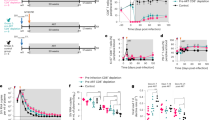Abstract
Latent HIV-1 persists in resting memory CD4+ T cells, even in patients receiving highly active antiretroviral therapy (HAART). It has been unclear how stable this latent reservoir is and whether its persistence reflects replenishment by low-level viremia. Here we show that even in treated patients who have had no detectable viremia for as long as 7 years, the reservoir decays so slowly (t1/2 = 44 months) that eradication is unlikely.
This is a preview of subscription content, access via your institution
Access options
Subscribe to this journal
Receive 12 print issues and online access
$209.00 per year
only $17.42 per issue
Buy this article
- Purchase on SpringerLink
- Instant access to full article PDF
Prices may be subject to local taxes which are calculated during checkout

Similar content being viewed by others
References
Gulick, R.M. et al. N. Engl. J. Med. 337, 734–739 (1997).
Hammer, S.M. et al. N. Engl. J. Med. 337, 725–733 (1997).
Perelson, A.S. et al. Nature 387, 188–191 (1997).
Chun, T.-W. et al. Nat. Med. 1, 1284–1290 (1995).
Chun, T.-W. et al. Nature 387, 183–188 (1997).
Finzi, D. et al. Science 278, 1295–1300 (1997).
Wong, J.K. et al. Science 278, 1291–1295 (1997).
Chun, T.W. et al. Proc. Natl. Acad. Sci. USA 94, 13193–13197 (1997).
Finzi, D. et al. Nat. Med. 5, 512–517 (1999).
Blankson, J.N. Annu. Rev. Med. 53, 557–593 (2002).
Zhang, L. et al. N. Engl. J. Med. 340, 1605–1613 (1999).
Ramratnam, B. et al. Nat. Med. 6, 82–85 (2000).
Dornadula, G. et al. JAMA 282, 1627–1632 (1999).
Ruff, C.T. et al. J. Virol. 76, 9481–9492 (2002).
Hermankova, M. et al. JAMA 286, 196–207 (2001).
Acknowledgements
We thank S. Barnett for coordinating patient visits. This work was supported by National Institutes of Health grant AI43222 to R.F.S. and by a grant from the Doris Duke Charitable Foundation.
Author information
Authors and Affiliations
Corresponding author
Ethics declarations
Competing interests
The authors declare no competing financial interests.
Supplementary information
Rights and permissions
About this article
Cite this article
Siliciano, J., Kajdas, J., Finzi, D. et al. Long-term follow-up studies confirm the stability of the latent reservoir for HIV-1 in resting CD4+ T cells. Nat Med 9, 727–728 (2003). https://doi.org/10.1038/nm880
Received:
Accepted:
Published:
Issue Date:
DOI: https://doi.org/10.1038/nm880




